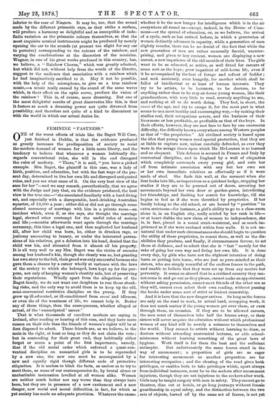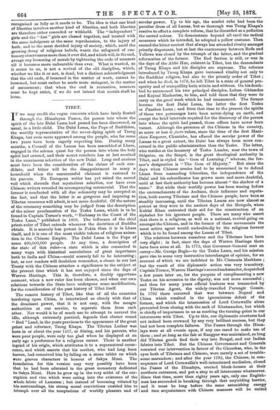FEMININE " FASTNESS."
ONE of the worst effects of trials like the Bagot Will Case, just finished in Dublin, is that the evidence produced so greatly increases the predisposition of society to resist the modern demand of women for a little more liberty, and the tendency to believe that whenever a woman habitually dis- regards- conventional rules, she will ' in the end disregard the rules of modesty. " There," it is said, " you have a picked example. Mrs. Bagot, the plaintiff in this case, was a lady of birth, position, and education, but with the fast ways of the pre- sent day, determined to live her own life and disregard antiquated roles, and you see what came of it. On the very best view of the ease for her "—and we may remark, parenthetically, that we agree with the Judge and jury that, on the evidence produced, the best view is the true one—" she associated familiarly with a hard-living set, and especially with a disreputable, hard-drinking Australian squatter, of £8,000 a year ; either did or did not go through some absurd ceremony of marriage with him in a private room—an incident which, even if, as she says, she thought the marriage legal, showed utter contempt for the useful rules of society and life ;—months afterwards went again through the marriage ceremony, this time a legal one, and then neglected her husband till, after her child was born, he, either in drunken rage, or jealousy amounting to lunacy, or under the interested persua- sions of his relatives, got a delusion into his head, denied that the child was his, and alienated from it almost all his property. It is all very well to say Mrs. Begot was the victim of enemies among her husband's kin, though she clearly was so, but granting her own story to the full, their greed was only successful because she gave them a chance by a career wholly at variance with the laws of the society to which she belonged, laws kept up for the pur- pose, not only of keeping women's chastity safe, but of preserving their reputations. Wholly apart from the allegations of the Begot family, we do not want our daughters to run those shock- ing risks, and the only way to avoid them is to keep up the old, semi-conventual restrictive discipline on the young. If they grow up ill-educated, or ill-conditioned from ennui and idleness, or even die of the weariness of life, we cannot help it. Better any of those things, than the consequences, whether alleged or actual, of the emancipated' career."
That is what thousands of excellent mothers are saying in Ireland, after reading or hearing of this case, and they have more reason on their aide than the friends of women's rights will be at first disposed to admit. Those friends are, as we believe, in the main in the right, at least so long as they do not claim the vote ; but in contending for their great end, they habitually either forget or scorn a point of the first importance, namely, that if the old social order which enforced a quasi-con- ventual discipline on unmarried girls is to be superseded by a new one, the new one must be accompanied by a
new and equally rigid though different code of protective etiquettes. It is useless to blink the facts, as useless as to try to meet them, as some of our contemporaries do, by brutal abuse or uncharitable insinuation levelled at all women alike. Women are neither much better nor any worse than they always have been but they are in presence of a new excitement and a new danger, new social and moral difficulties, in fact, for which as yet society has made no adequate provision. Whatever the cause, whether it be the new hunger for intelligence which is in the air everywhere all round us—except, indeed, in the House of Com- mons—or the spread of education, or, as we believe, the arrival of a cycle, such as has arrived before, in which a generation of women distinctly advances in capacity, while a generation of men slightly recedes, there can be no denial of the fact that while the new generation of men are rather unusually flaccid, unenter- prising, and given to lazy content, women are displaying a new unrest, a new impatience of the old moulds of their lives. The girls want to be as educated, as active, as well fitted for careers of some sort as the boys ; grow impatient of mill-horse life, even if it be accompained by the best of forage and softest of fodder ; and seek anxiously, even hungrily, for another which shall be fuller of intellectual or at least of human interests. They try to be artists, to be lecturers, to be doctors, to be anything rather than to be stay-at-home young women, like their grandmothers, with very little to read, scarcely anything to see, and nothing at all to do worth doing. They feel, in short, the ennui of the age, and try to escape it, for the most part in what seems to us a most healthy and encouraging way,—by making their studies real, their occupations severe, and the business of their lives more or less profitable, as profitable as that of the boys. In their efforts, however, they are met face to face by one enormous difficulty, the difficulty known everywhere among Western peoples as that of " the proprieties." All civilised society is based upon the idea that young women need special protection, that they are as liable to capture now, unless carefully defended, as ever they were in the savage times upon which Mr. McLennan is so learned and so eloquent. This defence is secured in France and Italy by conventual discipline, and in England by a wall of etiquettes which completely surrounds every young girl, and cuts her off from intimate association with any but her own sex or her own immediate relatives as effectually as if it were made of steel. She finds this wall, at the moment when she first looks into life, as impervious as a quickset hedge, stopping her studies if they are to be pursued out of doors, arresting her movements beyond her own door or garden-gates, interdicting her friendships, and limiting her search for knowledge, till she begins to feel as if she were throttled by proprieties. If her family belong to the old school, or are bound by " position " to extra strictness—for instance, a girl's ability to go to a class-room alone is, in an English city, really settled by her rank in life.* or at heart dislike the new claim of women to independence, she is, in fact, placed in a moral strait-waistcoat, and as much im- prisoned as if she were enclosed within four walls. It is not un- natural that under such circumstances she should begin to question the utility of these proprieties, to resent them, as well as the dis- abilities they produce, and finally, if circumstances favour, to set them at defiance, and to admit that she is " fast " merely for the sake of going her own way and living her own life. It is done every day, by girls who have not the slightest intention of doing harm or getting into harm, who are just as pure-minded as their sisters, who are simply resentful of the endless fences in the path, and unable to believe that they were set up from any motive but perversity. It seems so absurd that in a civilised country they can- not come in and go out as they please, cannot make an appointment without asking permission, cannot meet friends of the other sex as they will, cannot even select their own reading, without passing the books under some sort of strict or lenient censorship.
And it is here that the new danger arrives. So long as the fences are only on the road to work, to actual hard, occupying work, it does not much matter if the young women get over them, or even through them, on occasion. if they are to be allowed careers, the men must of themselves take half the fences away, or their sisters will never acquire the education without which professional women of any kind will be merely a nuisance to themselves and the world. They cannot be artists without learning to draw, or doctors without attending anatomical lectures, or able school- mistresses without learning something of the great laws of hygiene. Work itself is for them the best and the sufficient antiseptic. But unfortunately the same fences stand in the way of amusement ; a proportion of girls are as eager for interesting amusement as another proportion are for interesting occupation ; and the clearing of the road gives both privileges, or enables both to take privileges which, apart always from individual instances, must be to the seekers after amusement injurious, though they are not injurious to the seekers after work. Girls may be taught surgery with men in safety. They cannot go to theatres, dine out at hotels, or go long journeys without female guardianship in equal safety, and the distinction between the two sets of objects, barred off by the same set of fences, is not yet
recognised as fully as it needs to be. The idea is that one kind of liberties involves another kind of liberties, and both liberties are therefore either conceded or withheld. The " independent " girls and the "fast " girls are classed together, and treated with the same indulgence or the same reprehension, to the injury of both, and to the most decided injury of society, which, amid the growing decay of religious beliefs, wants the safeguard of cus- tomary observances more than it ever did, and which will, in the end, avenge any loosening of morals by tightening the code of manners till it becomes more unbearable than ever. What is wanted, as it seems to us, is not a revival of the old discipline, which, whether we like it or not, is dead, but a distinct acknowledgment that the old code, if loosened in the matter of work, cannot be loosened, but must rather be made more stringent, in the matter of amusement; that when the end is recreation, manners must be kept strict, if we do not intend that morals shall be loose.



































 Previous page
Previous page